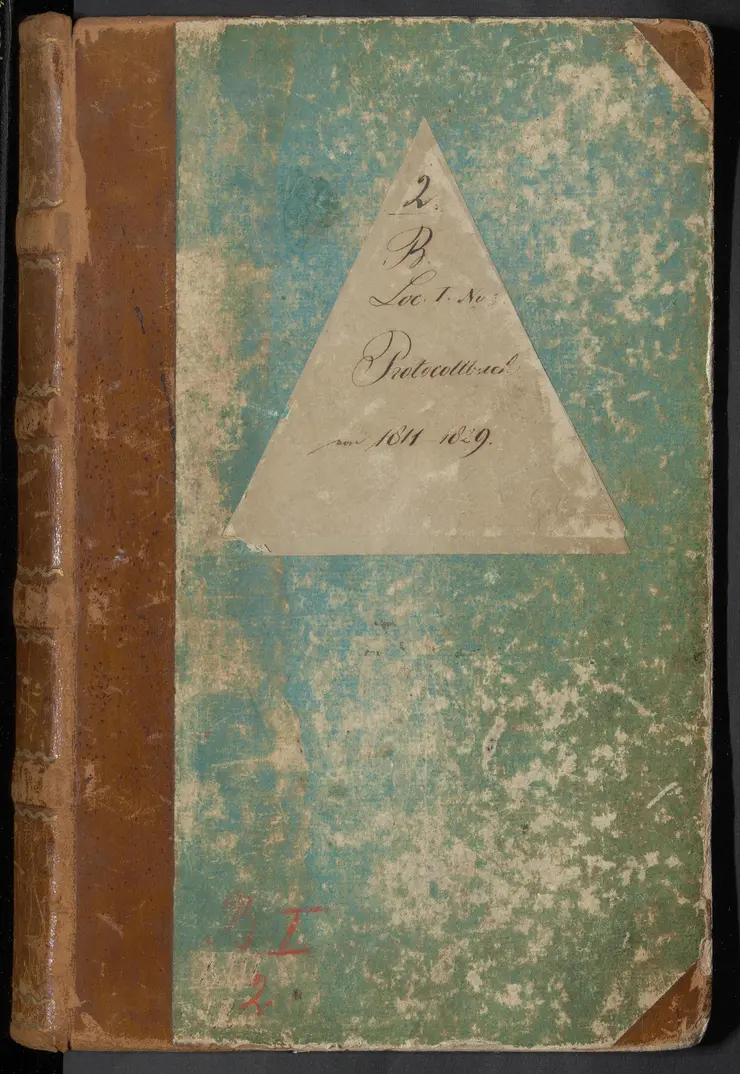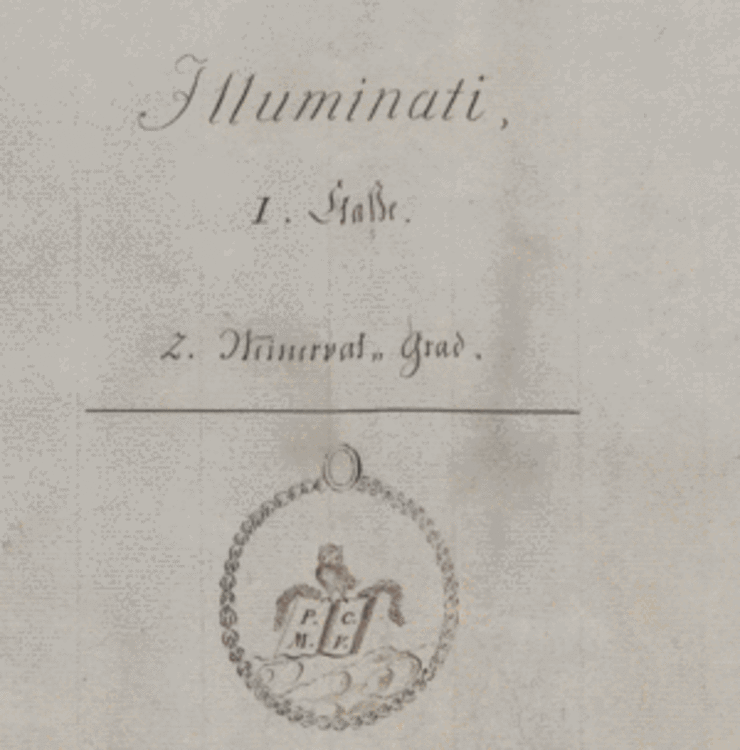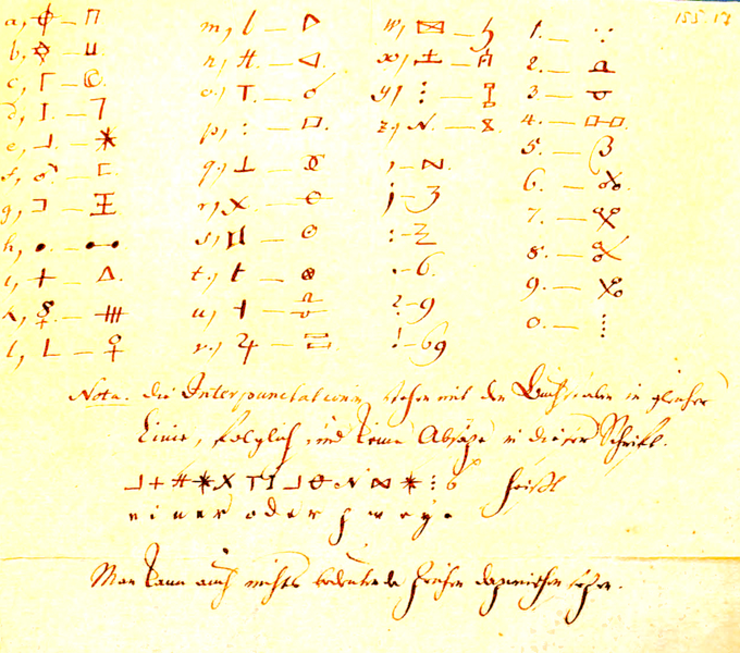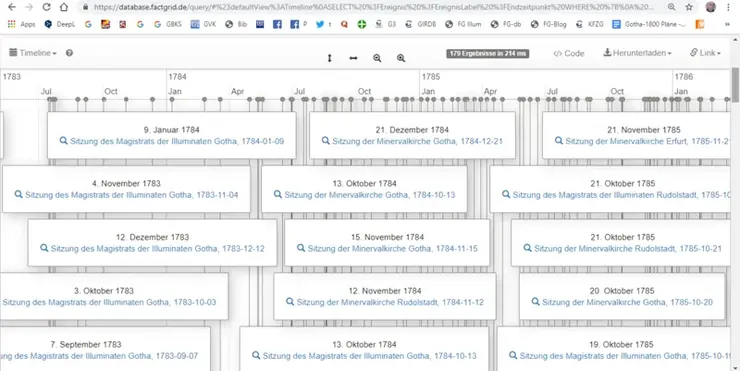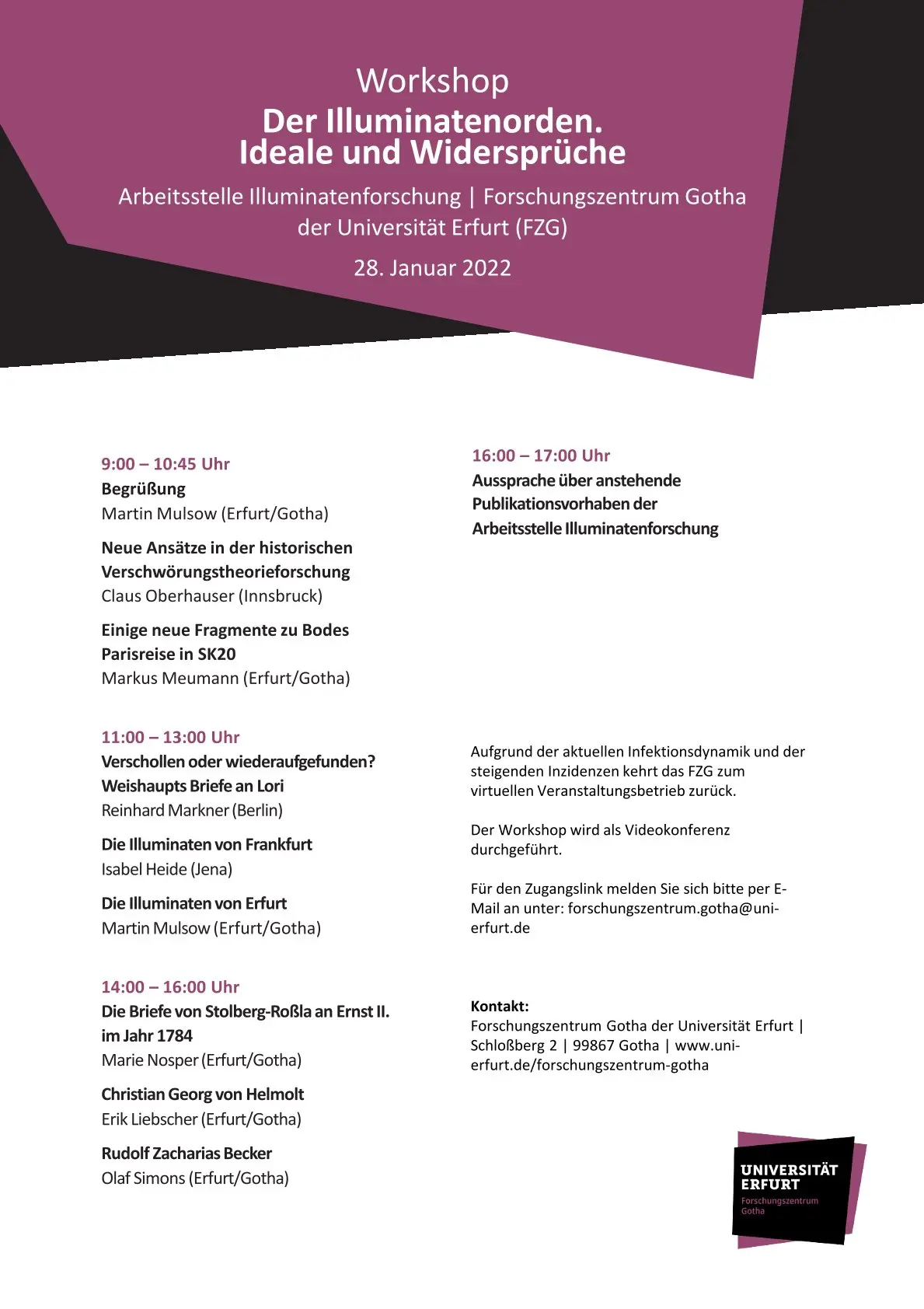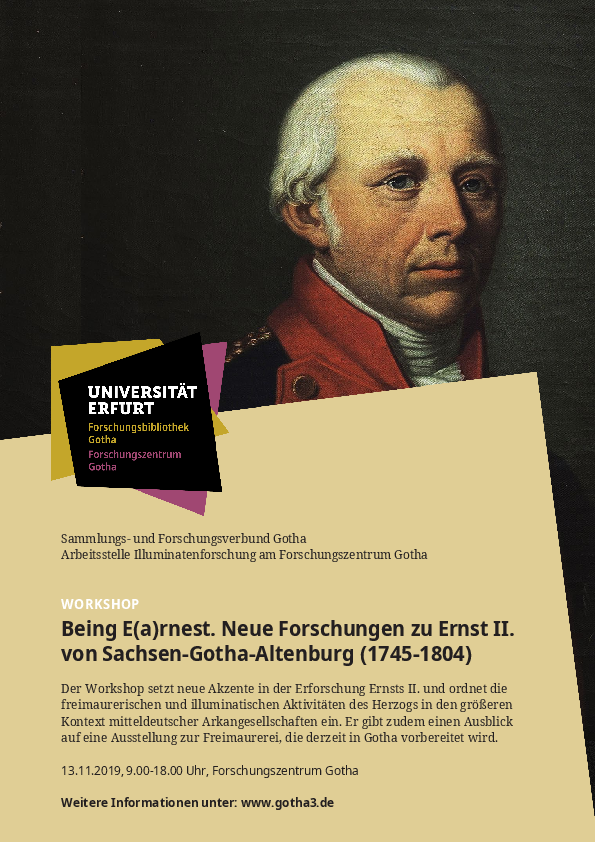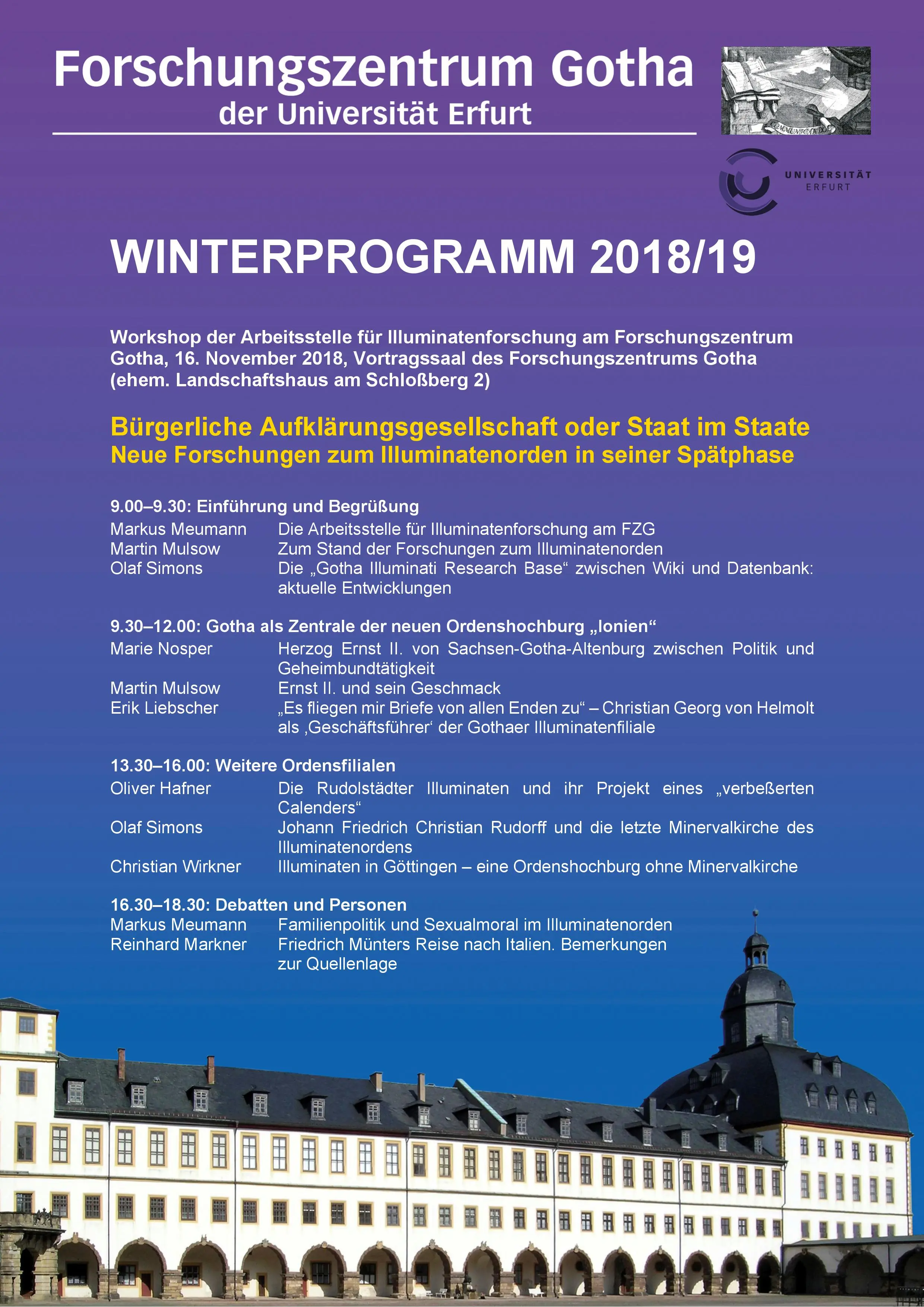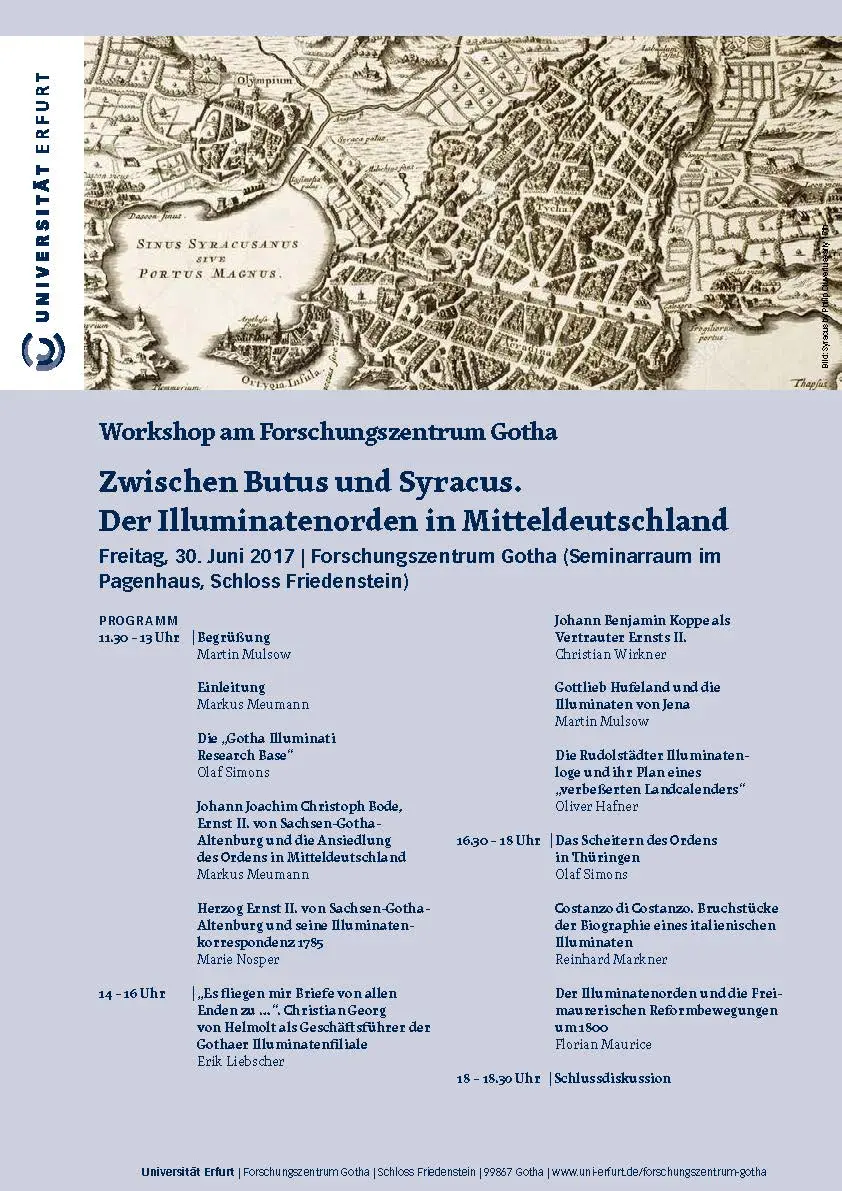In 2018 the Gotha Research Centre established a research department dedicated to the historical study of the Illuminati Order, which existed from 1776/78 to 1787/88. The most important goal is to make the written legacies of the Order and its members accessible to the public in such a way that they are also available to other researchers and anyone interested in the history of the Order for their own research interests and projects. In addition to academic publications and events, the researchers who have joined forces in the research department focus primarily on communicating their own academic findings and research results as well as making the most important historical sources accessible by using an online platform that functions as both an information portal and a virtual research environment: the "Gotha Illuminati Research Base" .
At the same time, the historical research on the Illuminati Order, which has attracted much interest in the historical sciences since its "rediscovery" by Richard van Dülmen in the 1970s, has so far been conducted mainly by individual researchers, and is now to be transferred into a long-term and sustainable research structure. The Gotha Research Centre seems to be a particularly suitable place for this: nowhere else has research on the Illuminati Order been so intensive in recent years as in Gotha.
The Order of the Illuminati
Founded in 1776 by the young professor of canon law Adam Weishaupt (1748-1830) at the University of Ingolstadt, the Order of the Illuminati - initially a kind of student convention whose members called themselves the "Perfectibilists" until 1778 - can probably be described without exaggeration as the most notorious secret society of all time. Although the order only existed for a good decade (according to current knowledge until 1787) and its geographical extent barely exceeded the borders of the Holy Roman Empire of the German Nation, it is nevertheless regarded in popular culture as the most influential secret society in world history, which infiltrated state and society in the years before the French Revolution and worked to overthrow the existing order. However, this widespread assumption is based less on historically verifiable facts and findings than on legends and conspiracy theories, which have gained considerable virulence or "virality" in recent decades through literature, film and, in particular, the internet, but which essentially arose in the temporal context of the French Revolution itself.
The ban on the Order in Bavaria in 1785, as a result of which secret papers and plans of the Order were confiscated during house searches and subsequently published in printed form, plays just as much a role as a trip to Paris in 1787 by Johann Joachim Christoph Bode (1731-1793), the chief organiser of the Order in Thuringia. Even though Bode was only able to win over a few French Freemasons to the Order during this visit, this is probably the starting point for the claim made by the Order's renegades and "conservative" opponents that the Illuminati had instigated the French Freemasons to instigate the revolution in France two years later.
Image: Degree text 1 Classe der Minervalen, from SK08.
Illuminati research
Modern scientific research into the Illuminati Order began in 1975 with Richard van Dülmen's study Der Geheimbund der Illuminaten. Presentation, Analysis, Documentation. In the wake of van Dülmen, who had based his account exclusively on the published writings of the Order, some of which had previously been seized from leading Illuminati, historical research in the following decade and a half increasingly focussed on the aims of the Order, which was now seen as "radically enlightened" or even early democratic, and its expansion in southern and western Germany. Leading members of the order such as Johann Friedrich Mieg (1744-1819), Franz Dietrich Frh. von Ditfurth (1738-1813) and above all Adolph Frh. (von) Knigge (1752-1796), who played a decisive role in the expansion of the order from 1780 onwards, also attracted the interest of researchers. However, the pivotal point of the historiography of the order remained the ban by the Electoral Palatinate Bavarian government in 1785, as a result of which the founder of the order, Weishaupt, had to flee Ingolstadt and initially found refuge in Regensburg, then from 1787 in Gotha.
It was only with the rediscovery of the so-called Schwedenkiste at the end of the 1980s, which contains correspondence and masonic materials as well as Johann Joachim Christoph Bode's illuminated archives of the order from 1783 to 1787, that research began to focus on the fact that the order had one of its centres in Thuringia, where Bode had been running a school since 1783/84 under the patronage of Duke Ernst II of Gotha (1745-1804). (1745-1804), which existed until the summer of 1787 and became the Order's last stronghold after Weishaupt's flight. At the same time, the materials handed down in the "Schwedenkiste" made it possible to better understand the Order's close-knit communication and support system, which only appears schematically in the published writings; however, research in this regard was essentially limited to well-known individual personalities such as Goethe, who had become a member of the Order in 1783, and Schiller, who was close to the Order but probably never joined, so that to this day many accounts of the Order regard Bavaria as its centre and 1785 as the year of its dissolution. The edition of the correspondence of the Illuminati Order compiled at the Interdisciplinary Centre for the Study of the European Enlightenment in Halle between 1998 and 2003 did nothing to change this, as the published volumes currently only go up to the summer of 1783 and therefore only depict the expansion of the Order in Thuringia in its very earliest beginnings.
In contrast, the researchers at the Gotha Centre for Illuminati Research have begun to compile a corpus of sources, initially in the context of the DFG-funded research project "Illuminati Essays of the Late Enlightenment. An unknown corpus of sources" funded by the DFG, but now also within the framework of university qualification work, to systematically analyse the material preserved in the "Schwedenkiste" and make it accessible for future research. This will make it possible, on the one hand, to understand the functioning of the order "on the ground", i.e. below the leadership level that was in correspondence with each other, and, on the other hand, to shed more light on the history of the order from a policy-centred perspective that is less focused on Bavaria and the political conditions there than was previously the case. Finally, the worldwide communication of these research results on the WordWideWeb will counter the abbreviated portrayal of the Order in the (media, digital) public, which is strongly characterised by conspiracy theories, legends and fictional adaptations.
Image: J. J. Chr. Bode's copy of the Illuminati "Geheimchiffre", <Skåp 9A 155.17> contributed by Josef Wäges.
The Gotha Illuminati Research Base
The Gotha Illuminati Research Base was set up as a MediaWiki as part of the project "Illuminati Essays in the Context of the Late Enlightenment" funded by the German Research Foundation (DFG) from 2013 to 2016 and has quickly become the central international reference address for information and new research on the Illuminati Order.
We are currently working on transforming it into a text platform with database support (based on Wikibase software) as part of the larger FactGrid project operated at the Gotha Research Centre.
A first glimpse of the visualisation possibilities that await us:
- Wikibase installation of the Gotha Illuminati Research Base in FactGrid
Image: The meetings of the Thuringian Illuminati, FactGrid Timeline.
Further research and perspectives
The research programme for the coming years envisages, on the one hand, the systematic indexing of the "Schwedenkiste" and other materials and estates relevant to the history of the Illuminati Order and their preparation for further research, possibly as part of externally funded research projects. On the other hand, it is our aim to communicate the knowledge gained about the historical Illuminati Order to the widest possible national and international public through the use of various media.
Publications
Books
Markus Meumann and Uta Wallenstein for the Friedenstein Castle Gotha Foundation (ed.): Freemasons and Mysteries of Egypt in Gotha. Academic volume and catalogue accompanying the exhibition at the Ducal Museum Gotha from 23.04.2023 to 15.10.2023, Petersberg 2023.
Markus Meumann and Olaf Simons (eds.): Enlightenment. Interdisziplinäres Jahrbuch zur Erforschung des 18. Jahrhunderts und seiner Wirkungsgeschichte, vol. 28 (2016): Aufsatzpraktiken im 18. Jahrhundert, Hamburg 2017, 427 p. (including several essays on the Illuminati Order by Reinhard Markner, John A. McCarthy, Peggy Pawlowski, Martin Mulsow and Olaf Simons, among others, see below).
Essays
Markus Meumann: From the Antechamber of the Enlightenment to its Back Room. The Gotha Masonic Lodge 1774-1793/1801 and its relationship to the Order of the Illuminati, in: Aufklärung und Residenzstadt. Das intellektuelle Gotha um 1800, ed. by Martin Mulsow and Dirk Sangmeister, Göttingen 2025 (approx. 50 pages, in print).
Markus Meumann, Olaf Simons: Illuminatism versus Mesmerism? Johann Joachim Christoph Bode's Encounters with Animal Magnetism on his Journey to Paris in the Summer of 1787, in: Animal Magnetism in Motion / Le magnétisme animal en mouvement. Reconfigurations and Circulations, 1776-1848 / Reconfigurations et circulations, 1776-1848, ed. by David Armando, Bruno Belhoste, Jean-Luc Chappey and Claire Gantet, Basel 2025, pp. 81-114.
Erik Liebscher: Christian Georg von Helmolt (1728-1805) as head of the Gotha Illuminati and Master of the Chair of the Masonic Lodge, in: Markus Meumann and Uta Wallenstein (eds.): Freimaurer und Mysterien Ägyptens in Gotha, Petersberg 2023, pp. 111-121.
Markus Meumann: European Lodge Foundations in the Context of Enlightened Sociability and the Search for a 'Higher Wisdom' (ca. 1730-1782), in: Markus Meumann and Uta Wallenstein (eds.): Freemasons and Mysteries of Egypt in Gotha, Petersberg 2023, pp. 19-25.
Markus Meumann and Martin Mulsow: Crisis and Reorientation of Freemasonry 1782-1806, in: Markus Meumann and Uta Wallenstein (eds.): Freemasons and Mysteries of Egypt in Gotha, Petersberg 2023, pp. 27-39.
Markus Meumann and Olaf Simons: Der Illuminatenorden in Thüringen 1783-1787 und die letzten Jahre der Gothaer Loge bis zu ihrer Aufhebung 1793, in: Markus Meumann and Uta Wallenstein (eds.): Freimaurer und Mysterien Ägyptens in Gotha, Petersberg 2023, pp. 67-87.
Martin Mulsow: The Egyptian Court of the Dead in Gotha. On the interaction between the Masonic Lodge and the Illuminati group 1783-1787, in: Markus Meumann and Uta Wallenstein (eds.): Freemasons and Mysteries of Egypt in Gotha, Petersberg 2023, pp. 101-109.
Marie Nosper, Erik Liebscher: Herzog Ernst II von Sachsen-Gotha und Altenburg als Freimaurer und Illuminat, in: Markus Meumann and Uta Wallenstein (eds.): Freimaurer und Mysterien Ägyptens in Gotha, Petersberg 2023, pp. 89-99.
Olaf Simons: From "Cosmopolitan" to "Rautenkranz". The foundation of the Gotha lodge in 1774 and why it became 'Swedish', in: Markus Meumann and Uta Wallenstein (eds.): Freemasons and Mysteries of Egypt in Gotha, Petersberg 2023, pp. 55-65.
Olaf Simons: Völkisch-national in den Untergang: Selbstliquidation und Zerschlagung der Gothaer Loge im Nationalsozialismus, in: Markus Meumann and Uta Wallenstein (eds.): Freimaurer und Mysterien Ägyptens in Gotha, Petersberg 2023, pp. 197-209.
Martin Mulsow: Mauvillon als Freimaurer und Illuminat, in: Arne Klawitter, Dieter Hüning, Gideon Stiening (eds.): Jakob Mauvillon (1743-1794) und die deutschsprachige Radikalaufklärung, Berlin 2022, pp. 325-362.
Martin Mulsow: Foundation of the Order of the Illuminati - an ethical worldview outside the church, in: Andreas Fahrmeir, Stefan von der Lahr (eds.): Deutschland global. Munich 2020.
Martin Mulsow: Als Adam Weishaupt einmal beinahe einen Musikabend verdorben hätte, in: Zeitschrift für Ideengeschichte 14.1 (2020), pp. 93-104.
Markus Meumann: Les Illuminés dits de Bavière et la France, in: Les échanges savants franco-allemands au XVIIIe siècle. Transferts, circulations, réseaux, Rennes 2019, ed. by Claire Gantet and Markus Meumann, pp. 299-316.
Martin Mulsow: The Illuminati on the Improvement of the Jews. With the edition of an unknown speech by Schlichtegroll on the death of Moses Mendelssohn from 1786, in: Mendelssohn-Studien 18 (2019), pp. 93-116.
Martin Mulsow: God's omnipresence. "Die Seele" - Eine unveröffentlichte Ode von Schack Hermann Ewald, in: Friedrich Vollhardt and Anton Friedrich Koch (eds.): Philosophy and Life. Dieter Henrich on his 90th birthday. Göttingen 2018, pp. 201-215.
Markus Meumann: Lodge speeches and practice lodges. On the practice of speaking and writing on given topics in 18th-century Freemasonry, in: Aufklärung 28 (2016): Aufsatzpraktiken im 18. Jahrhundert ed. by Markus Meumann u. Olaf Simons, Hamburg 2017, pp. 239-274.
Martin Mulsow: Bode, Weishaupt, Ernst II: Who was the 'boss' of the Illuminati? The years 1784-1793, in: Cord-Friedrich Berghahn, Gerd Biegel and Till Kinzel (eds.): Johann Joachim Christoph Bode. Studies on his life and work. Heidelberg 2017, pp. 403-434.
Martin Mulsow: The Gotha Illuminati as a continued "non-profit private society"? The essay practice of the Gothaer Sozietät from 1778 and the Minervalkirche from 1783-87, in: Markus Meumann and Olaf Simons (eds.) Aufsatzpraktiken im 18. Jahrhundert. Enlightenment. Interdisciplinary yearbook for research into the 18th century and its impact history. Hamburg 2017, pp. 343-360.
Martin Mulsow: "Ueber die Entwicklung unserer Geisteskräfte". An unknown materialistic psychology of the 1780s, in: Scientia Poetica 21 (2017), pp. 1-37.
Olaf Simons, Markus Meumann: "Mein Amt ist geheime gewissens Correspondenz". Bode als 'Unbekannter Oberer' des Illuminatenordens, in: Johann Joachim Christoph Bode - Studien zu Leben und Werk, ed. by Cord-Friedrich Berghahn, Gerd Biegel and Till Kinzel, Heidelberg 2017 (Germanisch-Romanische Monatsschrift - Beihefte; 83), pp. 435-503.
Olaf Simons: The Order of the Illuminati as a popular enlightener. Rudolph Zacharias Becker and the Order's failing project as a prize organiser, in: Aufklärung 28 (2016): Markus Meumann, Olaf Simons (eds.): Aufsatzpraktiken im 18. Jahrhundert. Hamburg 2017, pp. 377-410.
Markus Meumann and Olaf Simons: Illuminati, in: Encyclopedia of the Bible and its Reception, vol. 12: Ho Tsun Shen - Insult, Berlin/Boston 2016, pp. 880-883.
Martin Mulsow: Body, Mind, Sensation. An unknown expert report by Karl Leonhard Reinhold, in: Deutsche Zeitschrift für Philosophy 64 (2016), pp. 603-620.
Markus Meumann: Arcane Space and Public Debate in the Late Enlightenment. An illuminative addendum to the Mannheim infanticide prize question of 1780, in: Aufklärung 26 (2015), pp. 205-236.
Martin Mulsow: Discussion culture in the Illuminati Order. Schack Hermann Ewald und die Gothaer Minervalkirche, in: Marian Füssel and Martin Mulsow (eds.): Gelehrtenrepublik (Jahrbuch Aufklärung 26), Hamburg 2015, pp. 153-203.
Events and activities
Workshops and conferences
2022 " The Order of the Illuminati. Ideals and contradictions". Workshop of the Centre for Illuminati Research at the Gotha Research Centre, 28 January 2022; external guest: Dr Claus Oberhauser (Innsbruck)
2019 " Being E(a)rnest. New research on Ernst II of Saxe-Gotha-Altenburg (1745-1804)"
Workshop of the Gotha Collection and Research Network and the Illuminati Research Unit at the Gotha Research Centre, 13 November 2019;
external guests: Professor Dr Joachim Bauer and Dr Gerhard Müller (both Jena)
2018 "Civil Enlightenment society or state within the state. New research on the Illuminati Order in its late phase". Workshop of the Illuminati Research Unit at the Gotha Research Centre, 16 November 2018
2017 " Between Butus and Syracuse. Der Illuminatenorden in Mitteldeutschland"
Final workshop of the DFG project "Illuminatenaufsätze der Spätaufklärung" at the Gotha Research Centre, 30 June 2017; external guest: Dr Florian Maurice (Munich)
Lectures and presentations
2022
Isabel Heide: "Die Illuminaten von Frankfurt", lecture at the workshop "Der Illuminatenorden. Ideals and Contradictions". Workshop of the Centre for Illuminati Research at the Gotha Research Centre, 28 January 2022.
Isabel Heide: "Die Kaufmannschaft im Illuminatenorden", lecture at the colloquium "Neuere Forschungen zum 19. Jahrhundert" at the Friedrich Schiller University Jena, 16 May 2022.
Erik Liebscher: "Christian Georg von Helmolt", lecture at the workshop "Der Illuminatenorden. Ideals and Contradictions". Workshop of the Centre for Illuminati Research at the Gotha Research Centre, 28 January 2022.
Reinhard Markner: "Lost or rediscovered? Weishaupt's letters to Lori", lecture at the workshop "Der Illuminatenorden. Ideals and Contradictions". Workshop of the Centre for Illuminati Research at the Gotha Research Centre, 28 January 2022.
Markus Meumann: "Einige neue Fragmente zu Bodes Parisreise in SK20", lecture at the workshop "Der Illuminatenorden. Ideals and Contradictions". Workshop of the Centre for Illuminati Research at the Gotha Research Centre, 28 January 2022.
Martin Mulsow: "Is Wealth Right Or Wrong? The Illuminati Order and Criminal Law Reform in Late 18th Century Germany", Keynote Lecture at the Nordic 18th Century Conference, Copenhagen, 24 August 2022
Martin Mulsow: "Die Illuminaten von Erfurt", lecture at the workshop "Der Illuminatenorden. Ideals and Contradictions". Workshop of the Centre for Illuminati Research at the Gotha Research Centre, 28 January 2022.
Marie Nosper: "Die Briefe von Stolberg-Roßla an Ernst II. im Jahr 1784", lecture at the workshop "Der Illuminatenorden. Ideals and contradictions". Workshop of the Centre for Illuminati Research at the Gotha Research Centre, 28 January 2022.
Olaf Simons: "Publizist im Geheimorden - Beckers Tagebuch seiner Illuminatenmitgliedschaft", lecture at the conference "Rudolph Zacharias Becker und das intellektuelle Gotha um 1800" at the Gotha Research Centre, 9 June 2022.
Olaf Simons: "Rudolf Zacharias Becker", lecture at the workshop "Der Illuminatenorden. Ideals and Contradictions". Workshop of the Centre for Illuminati Research at the Gotha Research Centre, 28 January 2022.
2021
Isabel Heide: "Die Frankfurter Minervalkirche (1780-1785)", lecture at the colloquium "Neuere Forschungen zum 19. Jahrhundert" at the Friedrich Schiller University Jena, 7 July 2021.
Markus Meumann, Olaf Simons: "Der Illuminatenorden in Thüringen - und warum 'Hieropolis' (Weimar) scheiterte", lecture at the 116th Masonic Academy of the Supreme Council for Germany of the Freemasons of the Ancient and Accepted Scottish Rite on 4 September 2021.
2020
Martin Mulsow: Christian Wilhelm Wehrn, Illuminat in Erfurt, lecture at the conference "Digital Prosopography", Gotha Research Centre, 2/3 November 2020.
2019
Performance of the meeting of the Gotha local group ("Minervalkirche") from 28 December 1786 at the "Long Night of Sciences" on 8 November 2019 in Erfurt (with the participation of Marian Hefter, Erik Liebscher, Markus Meumann, Martin Mulsow, Marie Nosper and Olaf Simons).
Markus Meumann, Olaf Simons: "Building an Enlightenment Identity? The Practice of Essay Writing within the Order of the Illuminati", 15th International Congress on the Enlightenment, Edinburgh, 14-19 July 2019.
Martin Mulsow: "Die Illuminaten, Schiller und die Anfänge des Kantianismus", lecture at the DHI in London, 9 May 2019.
Olaf Simons: "The Order of the Illuminati", Senior Academy Walthershausen, 10 February 2019.
Olaf Simons: "Friedrich Christian Rudorff und der Illuminatenorden als zwielichtige Freundesbörse", lecture at the academic colloquium "Gefährliche Freundschaften" for Martin Mulsow on his 60th birthday, Gotha, 1-2 November 2019.
Olaf Simons: "Glimpses into the Swedish box: Johann Joachim Christoph Bode and Ernest II as collectors of masonic and hermetic writings?", conference "Being E(a)rnest. New research on Ernest II of Saxe-Gotha-Altenburg", Gotha, 13 November 2019.
2018
Oliver Hafner: "Die Rudolstädter Illuminaten und ihr Projekt eines 'verbeßerten Calenders'", lecture at the workshop "Bürgerliche Aufklärungsgesellschaft oder Staat im Staate? New research on the Illuminati Order in its late phase", Gotha, 16 November 2018.
Erik Liebscher: "'Letters are flying to me from all ends' - Christian Georg von Helmolt as 'managing director' of the Gotha branch of the Illuminati", lecture at the workshop "Bürgerliche Aufklärungsgesellschaft oder Staat im Staate? New research on the Illuminati Order in its late phase", Gotha, 16 November 2018.
Markus Meumann: "Familienpolitik und Sexualmoral im Illuminatenorden", lecture at the workshop "Bürgerliche Aufklärungsgesellschaft oder Staat im Staate? New research on the Illuminati Order in its late phase", Gotha, 16 November 2018.
Martin Mulsow: "Schlichtegroll's Pathos", lecture at the workshop "Bürgerliche Aufklärungsgesellschaft oder Staat im Staate? New research on the Illuminati Order in its late phase", Gotha, 16 November 2018.
Marie Nosper: "Herzog Ernst II von Sachsen-Gotha-Altenburg zwischen Politik und Geheimbundtätigkeit", lecture at the workshop "Bürgerliche Aufklärungsgesellschaft oder Staat im Staate? New research on the Illuminati Order in its late phase", Gotha, 16 November 2018.
Olaf Simons: "Johann Friedrich Christian Rudorff und die letzte Minervalkirche des Ordens", lecture at the workshop "Bürgerliche Aufklärungsgesellschaft oder Staat im Staate? New research on the Illuminati Order in its late phase", Gotha, 16 November 2018.
2017
Oliver Hafner: "Die Rudolstädter Illuminatenloge und ihr Plan eines 'verbeßerten Landcalenders'", lecture at the workshop "Zwischen Butus und Syracus. The Illuminati Order in Central Germany", Gotha, 30 June 2017.
Erik Liebscher: "'Letters fly to me from all ends' - Christian Georg von Helmolt as 'managing director' of the Gotha branch of the Illuminati", lecture at the workshop "Zwischen Butus und Syracus. The Order of the Illuminati in Central Germany", Gotha, 30 June 2017.
Reinhard Markner: "Costanzo di Costanzo. Fragments of the biography of an Italian Illuminati, lecture at the workshop "Zwischen Butus und Syracus. The Order of the Illuminati in Central Germany", Gotha, 30 June 2017.
Markus Meumann: "Johann Joachim Christoph Bode, Ernst II von Sachsen-Gotha-Altenburg und die Ansiedlung des Ordens in Mitteldeutschland", lecture at the workshop "Zwischen Butus und Syracus. The Illuminati Order in Central Germany", Gotha, 30 June 2017.
Markus Meumann: "Der Illuminatenorden im Spiegel seiner Wissensproduktion. Aufsatzpraktiken arkaner Sozietäten um 1780", International Conference "Aufgeklärte Sozietäten, Literatur und Wissenschaft in Mitteleuropa", Budapest, 13 October 2017.
Martin Mulsow: "Eine Mittelalter-Konstellation: Gottlieb Hufeland, Friedrich Schiller und die Illuminaten", lecture at the workshop "Zwischen Butus und Syracus. The Order of the Illuminati in Central Germany", Gotha, 30 June 2017.
Marie Nosper: "Herzog Ernst II. von Sachsen-Gotha-Altenburg und seine Illuminatenkorrespondenz 1785", lecture at the workshop "Zwischen Butus und Syracus. The Illuminati Order in Central Germany", Gotha, 30 June 2017.
Olaf Simons: "Das Scheitern des Illuminatenordens in Thüringen", lecture at the workshop "Zwischen Butus und Syracus. The Illuminati Order in Central Germany", Gotha, 30 June 2017.
Christian Wirkner: "Johann Benjamin Koppe als vertrauter Ernsts II.", lecture at the workshop "Zwischen Butus und Syracus. The Order of the Illuminati in Central Germany", Gotha, 30 June 2017.
Qualification theses
2021 Isabel Heide: "The Frankfurt Minerva Church as a 'special case' in the Illuminati Order? The years 1780-1785", bachelor's thesis at the Friedrich Schiller University Jena.
2019 Oliver Hafner, "Die Rudolstädter Illuminaten und ihr Projekt eines 'verbeßerten Land-Calenders'", master's thesis at the University of Erfurt (expert reports: Professor Dr Martin Mulsow, Dr Markus Meumann)
The Illuminati and our research in the media
Expert interview with Dr Markus Meumann as part of the programme "Conspiracy? The secret of the Freemasons and Illuminati | Terra X", 6 August 2023
Podcast series on secret societies of the Bavarian Academy of Sciences and Humanities with the participation of Dr Olaf Simons, Illuminati Research Centre
Radio feature in the MDR Thuringia Culture Night"Thuringia and the end of the Illuminati" from 23 April 2023 with Dr Markus Meumann
MP3
Agency report"Protractors and compasses: Show on Freemasons in Gotha" on FAZ Online, Welt Online, NTV Online etc. from 20 April 2023
Television report by MDR Thüringen Journal entitled"Herzogliches Museum in Gotha zeigt Wirken der Freimaurer" from 20 April 2023, with Dr Markus Meumann, among others
Radio report"Freemasonry exhibition in Gotha" from 23 April 2023 in the ducal museum of the Friedenstein Castle Foundation, with Dr Markus Meumann
ZDF television report with Professor Martin Mulsow and others"Myth: the secret of the Illuminati" from 1 November 2021
Radio report on WDR 5 from 1 May 2021 about the founding of the Illuminati Order with an interview with Dr Olaf Simons:
"Foundation of the Illuminati Order (on 1 May 1776)", an article by Thomas Pfaff
Article in SPIEGEL Online from 10 June 2020 about the history of the Illuminati - SPIEGEL Online in conversation with Dr Olaf Simons:
"The amazing career of the Illuminati"
